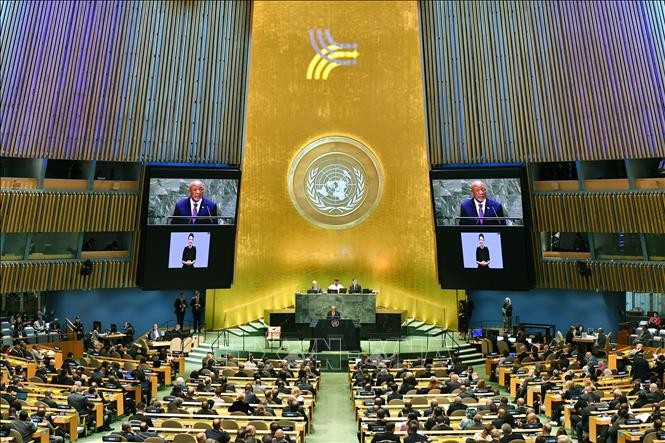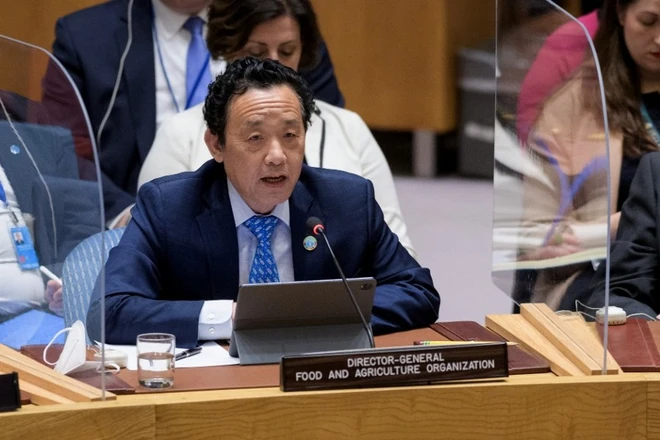(VOVWORLD) - The ongoing UN General Assembly High-level Week is overshadowed by the threat of conflicts in many parts of the world and urgent pressure to reform itself.
 The plenary meeting of the 79th UN General Assembly in New York on September 22, 2024. (Photo: Xinhua/VNA) The plenary meeting of the 79th UN General Assembly in New York on September 22, 2024. (Photo: Xinhua/VNA) |
On Monday and Tuesday, just before the 79th United Nations General Assembly (UNGA-79) High-level Week, many state leaders attended the UN Summit of the Future and adopted the Future Compact, outlining 56 action commitments for the coming decades. The Future Compact is a response to growing doubts about the UN's role in ensuring global peace and security.
Insecurity around the world
With state leaders gathered at UN Headquarters in New York, the world is seeing signs of possible new conflicts. In the Middle East, the confrontation between Israel and Hezbollah in Lebanon has escalated, bringing both sides to the brink of a full-fledged war. Israeli airstrikes on southern Lebanon on Monday killed 500 people, making it the deadliest day in Lebanon since the country’s civil war from 1975 to 1990.
A day earlier, Hezbollah declared all-out war against Israel. With the conflict between Israel and Hamas in Gaza showing no sign of ending after nearly a year, a conflict between Israel and Hezbollah with much stronger capabilities than Hamas, could push the entire Middle East region into a devastating war.
What is happening in the Middle East challenges the UN to fulfill its role as a guarantor of global peace and security. Since the fighting in Gaza began last October, nearly 50,000 people have been killed, about two-thirds of them women and children.
Apart from humanitarian relief activities, the UN seems stymied at having any effect on the conflict. It’s the same with the Ukraine conflict, which is about to enter its third year.
Many UN members agree that the main reason for this ineffectiveness is the outdated rules of the UN Security Council, where each of the five permanent members (the UK, France, the US, Russia, and China) has veto power.
Reforming the UN, particularly the UNSC, should not be delayed, says Chilean President Gabriel Boric. “2024 is not 1945. We have seen many times that some countries, because of geopolitical conflicts, veto a resolution. But today's world is no longer the same. These countries should not have the right to veto and the Security Council does not represent today's world.”
Turkish Foreign Minister Hakan Fidan says the power of the UN General Assembly, which includes all UN member states, should be increased, instead of concentrating all power in the Security Council. “We need to democratize the decision-making procedure at the UN. International peace and security cannot be left to the will of a privileged clique, consisting of a limited number of countries."
Climate change and sustainable development
Besides the urgent need to reform the UN, the General Assembly must discuss many other global challenges, such as countries' commitments to combating climate change and progress in achieving Sustainable Development Goals by 2030 (according to the UN roadmap).
UNGA-79 will be the last high-level diplomatic event before the 29th UN Conference on Climate Change (COP29) to be held in November in Azerbaijan. During the High-level Week, countries need to agree on more ambitious goals: a new global financial agreement to replace the 100-billion-USD-per-year commitment that will expire next year, a roadmap for eliminating fossil fuels, and progress in implementing the Nationally Determined Contribution (NDC) to be submitted to the UN early next year.
 Qu Dongyu, Director-General of the UN Food and Agriculture Organization (Photo: Xinhua) Qu Dongyu, Director-General of the UN Food and Agriculture Organization (Photo: Xinhua) |
The UN needs to create new momentum for members in achieving the SDGs by 2030, as many SDG efforts are being hampered by unstable security and worsening impacts of climate change.
Qu Dongyu, Director-General of the UN Food and Agriculture Organization, said: “The world faces a daunting food security and nutrition picture. More than 730 million people worldwide faced hunger in 2023, and more than 2.3 billion were moderately or severely food insecure. We are not on track to achieve any of the global SDG targets. And we see that huge inequalities persist along various dimensions – including wealth, gender, urbanization, and access to assets and opportunities.”
South-South cooperation among developing countries will be another major topic, as the Global South finds a greater voice in international affairs.
In the first few days of the year’s biggest diplomatic week, hundreds of bilateral meetings between developing countries have been held and many cooperation agreements have been signed in economics, trade, energy, technology, and other fields.